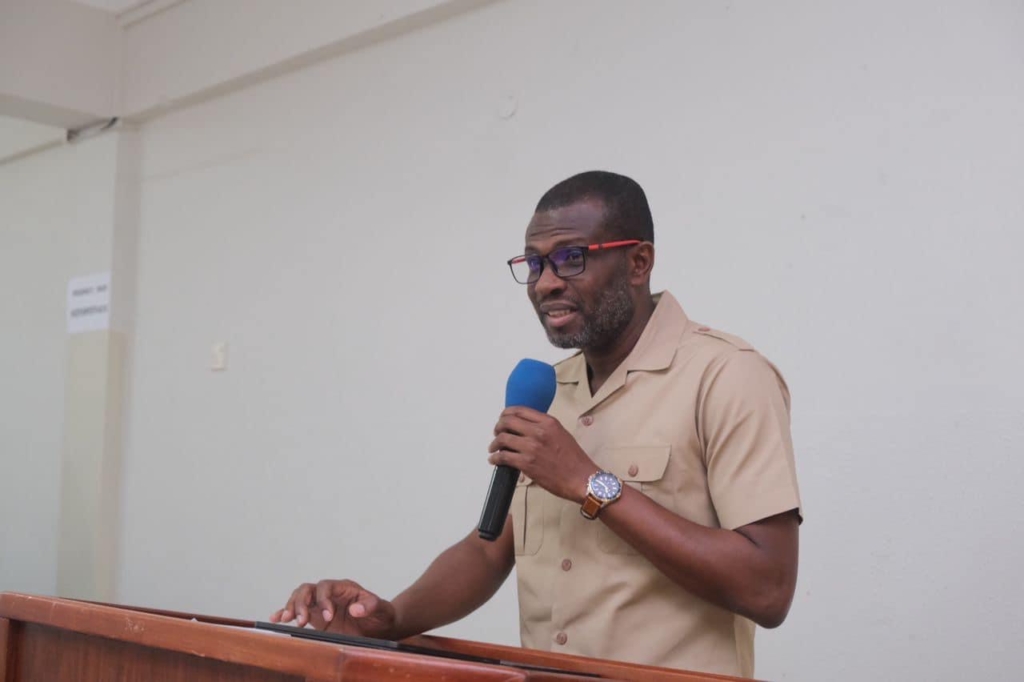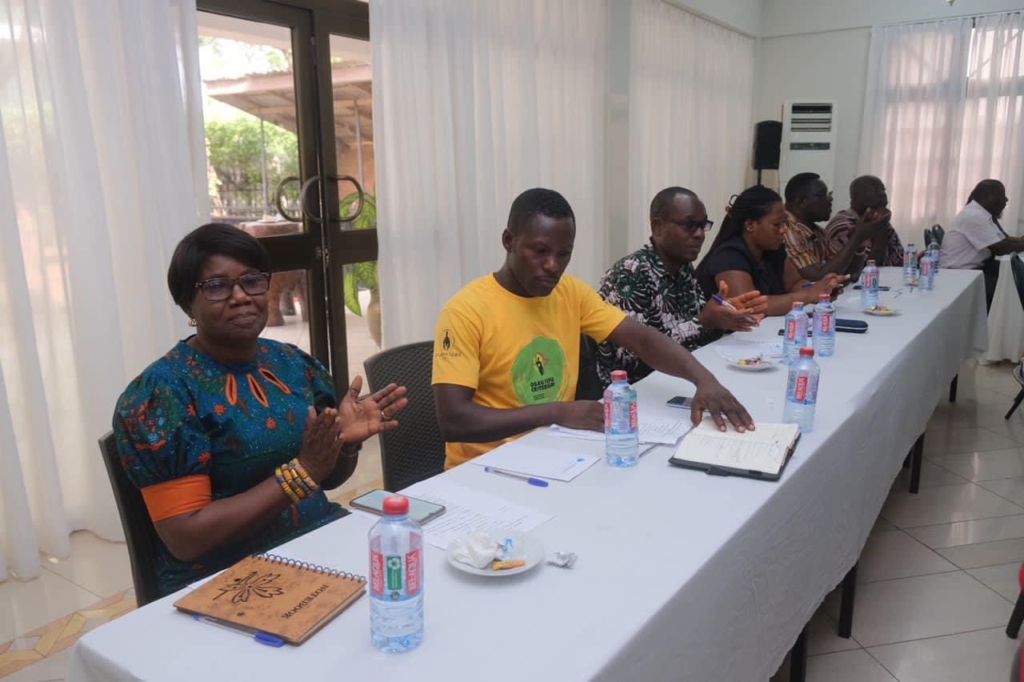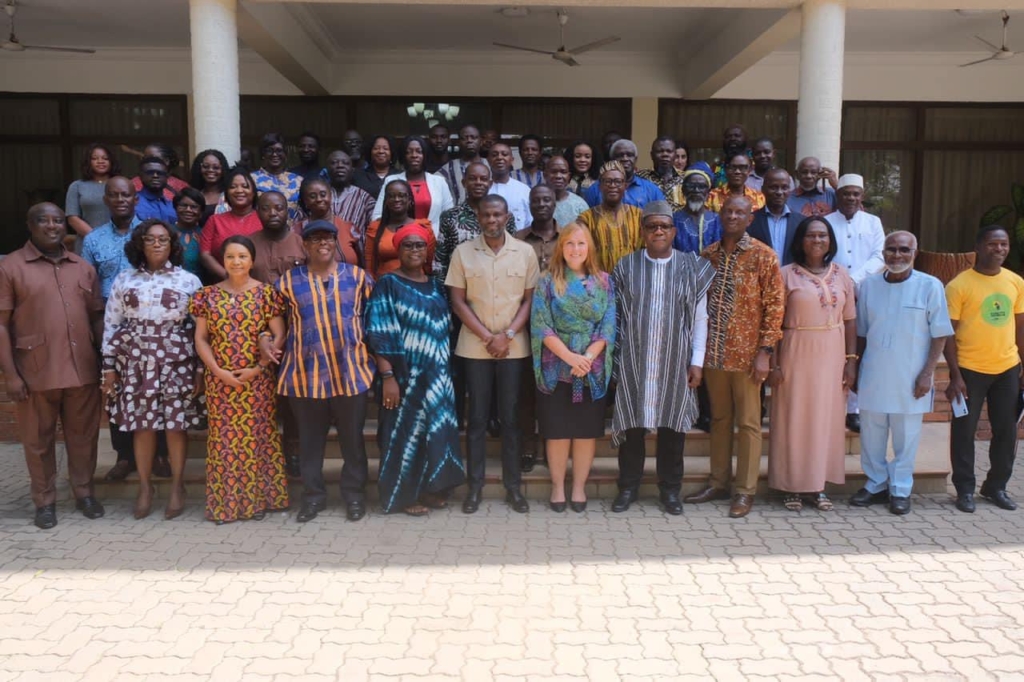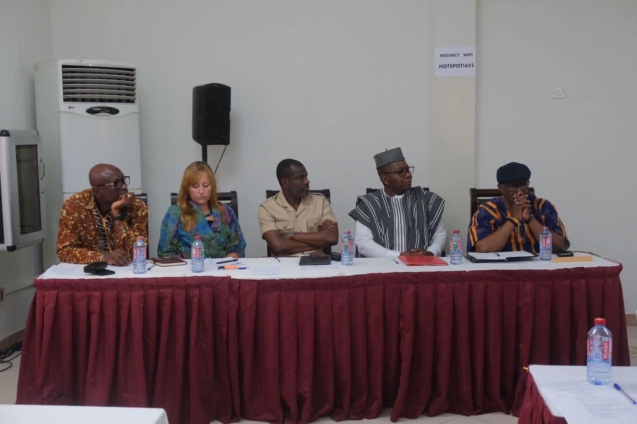A stakeholder consultation has been held at the Coconut Grove Regency Hotel in Accra on Tuesday, November 21, 2023, to discuss the new draft Cultural Policy that has been developed by a twenty-member committee inaugurated on 22nd August 2023 at the Central Hotel in Accra.
Giving the keynote address, the Deputy Minister for Tourism, Arts and Culture, Hon. Mark Okraku Mantey echoed the need to teach our culture to our children so they would not be ignorant about it.
According to him, culture has a profound impact on our identity, our unity and our national development.
Speaking at the meeting, he said, he deemed it a privilege to be part of the process of embarking on a journey of reflections and renewal, a journey that holds the potential to shape the cultural landscape of our great nation, Ghana.

He said, our duty as a Ministry must be to help safeguard and celebrate our culture, ensuring that it remains vibrant and relevant for generations yet to come.
He said the 2004 Cultural Policy laid the foundation for the promotion and preservation of our cultural heritage. However, times have changed and so have the challenges and opportunities that we face. There is therefore the need to assess, adapt and enhance our cultural policy to align with the dynamic and evolving needs of society.
He asked all not to see the consultation as mere formality, but rather as a testament of the Ministry’s commitment to inclusivity, collaboration and participatory governance.
To him, the presence of all in the meeting signified their dedication to the cultural prosperity of Ghana. According to him the insights, experiences and perspectives are invaluable and will help collectively to craft a vision that will guide our culture policy for the years ahead.

He said our cultural heritage should be a source of pride and a wellspring of creativity. Through this new policy, our aim should be to bolster the cultural sector, ensuring that it thrives as a beacon of inspiration, innovation and economic vitality.
While doing so, we should not forget that culture helps in fostering national unity and social cohesion. He said in a world marked by diversity, our cultural policies must be vehicles for inclusivity, respecting and celebrating the richness of our differences. We must leverage culture as a bridge that connects the various strands of our society, fostering understanding and harmony.

He urged all present to actively engage in the discussions that will, in the days ahead by sharing experiences, voicing out concerns and proposing innovative ideas. According to him, it is an opportunity for us to shape the future of Ghana's cultural landscape.
Concluding his remarks, he expressed his gratitude to the Review Committee, the Chief Director, his team and all the stakeholders who have contributed to this vital initiative.
Together, he said we could weave a cultural tapestry that reflects the aspirations and diversity of the Ghanaian people, and this will be a testament to our shared heritage and our collective journey toward a brighter future. Giving his perspectives on the Culture Policy, the new UNESCO Country Representative to Ghana, Mr Edward Moukala, said given the challenges currently being experienced globally, and its interconnectedness, the only way to attain a sustainable future is to give priority to government policies. Policies according to him respond to the aspirations of diverse populations and guarantee pluralism and respect for human rights. Culture provides the many resources that can respond and adapt to challenges faced by development by playing a transversal and effective role in all areas of public policy.
Given the scale of contemporary global challenges and their interconnectedness, achieving a more sustainable future must be the priority of all public policies today. In more fragmented societies, public policies must respond to the aspirations of diverse populations, as well as guarantee pluralism and respect for fundamental rights. Culture provides boundless resources in responding and adapting to development challenges by playing a transversal and effective role in all areas of public policy. Culture constitutes a source of identity and cohesion for communities and peoples. It is their collective memory. It forges, over time, national identity both in the political and diplomatic dimensions and in the economic fields. Through its contribution to creativity, it contributes to the emergence of open, inclusive, pluralistic and resilient communities.
In addition to being an autonomous policy area, culture crosses the broad spectrum of public policies, and acts as a catalyst and engine that helps to achieve a variety of development perspectives. For example, sustainable and inclusive development, climate action, quality education for all, civil society engagement, social justice and strategic partnerships, and integration of culture into policies, strategies, plans, development programs, projects and processes offer a multitude of opportunities for communities.
It is because of this that UNESCO through the United Nations, 2030 Agenda of 17 Sustainable Development Goals with its 169 target cultural conventions, provides a solid framework for cultural cooperation and cultural diplomacy across countries and regions, to help with its implementation of the agenda.
According to him, the commitment and motivation of people in favour of their culture depend on the positive perception they have of their past, the value and relevance of their culture of which history and language constitute the basis and substance.
There is therefore the need to get rid of all the falsifications, distortions and biased interpretations about our culture as portrayed to us by the whites in the past and reinvest in a new strategic vision essential for us to achieve its optimal effectiveness.
This means we need to use our mother tongues in addition to colonial languages and the system of education must employ endogenous knowledge and know-how in addition to other knowledge.
He advocated the need to allocate 1% of the national budget to support the development of cultural policies.
Again, he advocated the need to promote our culture by adopting the following strategies:
• Financing the cultural economy and key cultural infrastructure
• Training of young people and cultural actors
• The digital transition and arts, culture and heritage
• Through advocacy Promote cultural activities.
Mr Moukala appealed to all stakeholders, as well as the sub-regional, regional and interregional institutions, including development banks, to help by providing support.
According to him, protection and safeguarding of cultural heritage and support for creativity are fundamental to meeting the challenges of our time, fighting against the effects of climate change, poverty, inequalities (the digital divide) emergencies and increasingly complex conflicts.
He said UNESCO was convinced that no development can be sustained without a strong cultural component and that only a human-centred approach to development based on mutual respect and open dialogue between cultures can bring about lasting peace.

He emphasized the importance of culture in the developmental process and the need for a Heritage law based on a Revised Culture Policy.
Architect Derban stated that architecture should be one of the main drivers in the new culture policy. He lauded the government for leading the way by encouraging architects through workshops and seminars to incorporate indigenous ideas in the design of settlements, public facilities and buildings using cultural expressions.
According to him, Accra has started to manifest the incorporation of cultural expressions in modern buildings being put up in the city and cited examples as the National Theatre of Ghana, Ridge Towers, Jubilee House, the CAL Bank Headquarters and the World Bank building which have been built using adinkra symbols for excellence in their designs,
The growing trend of using African symbols to design buildings is not only common in Ghana. Other countries have also found a way of using their symbols in the design of their monuments and buildings which are backed by laws.
He was of the view that, as a country, when we have a museum for cinemas and film, it will manifest the importance of having a heritage law in place. He argued on the need for a national heritage list and traditional symbols which can be used to turn around our country. He emphasised the need for the involvement of architects in the listing of these symbols and heritage buildings for UNESCO. The symbols are being lost because of the preference for the use of building materials from other countries due to civilization and urbanisation.
Architect Derban also said there are family buildings which have played significant roles in the history of our nation and are gradually being forgotten and must be preserved to tell their story. These need to go through preservation and restoration methods and must be backed by law to prevent them from being left to waste.
They were solidarity messages from the Ambassador of the European Union to Ghana, Mr Irchad Razaaly which was read on his behalf by Ms Margo Pitura and the Secretary General of the Ghana National Commission of UNESCO, Mrs Ama Serwa Nerquaye-Tetteh, also read on her behalf by Mr Chris Wetcher. The messages expressed hope and appreciation and their willingness to support the Ministry.
Nana Akwasi Gyan Apenteng, Chairman of the Culture Policy Review Committee took participants through the draft document for their inputs and comments.
Latest Stories
-
CHAN 2024Q: ‘It’s still an open game’ – Didi on Ghana’s draw with Nigeria
3 minutes -
CHAN 2024Q: Ghana’s Black Galaxies held by Nigeria in first-leg tie
1 hour -
Dr Nduom hopeful defunct GN bank will be restored under Mahama administration
2 hours -
Bridget Bonnie celebrates NDC Victory, champions hope for women and youth
2 hours -
Shamima Muslim urges youth to lead Ghana’s renewal at 18Plus4NDC anniversary
3 hours -
Akufo-Addo condemns post-election violence, blames NDC
3 hours -
DAMC, Free Food Company, to distribute 10,000 packs of food to street kids
4 hours -
Kwame Boafo Akuffo: Court ruling on re-collation flawed
4 hours -
Samuel Yaw Adusei: The strategist behind NDC’s electoral security in Ashanti region
4 hours -
I’m confident posterity will judge my performance well – Akufo-Addo
5 hours -
Syria’s minorities seek security as country charts new future
5 hours -
Prof. Nana Aba Appiah Amfo re-appointed as Vice-Chancellor of the University of Ghana
5 hours -
German police probe market attack security and warnings
5 hours -
Grief and anger in Magdeburg after Christmas market attack
6 hours -
Baltasar Coin becomes first Ghanaian meme coin to hit DEX Screener at $100K market cap
6 hours

